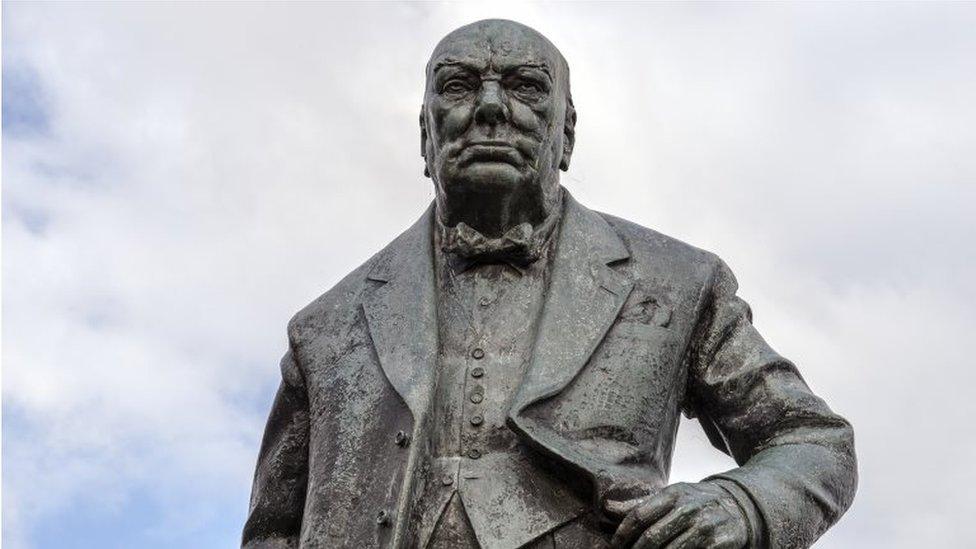Boris Johnson accuses charity of airbrushing Winston Churchill
- Published

Boris Johnson has accused a charity of trying to airbrush the achievements of ex-Prime Minister Winston Churchill.
His criticism came after the Winston Churchill Memorial Trust renamed itself The Churchill Fellowship and removed images of the ex-PM from its website.
Sir Nicholas Soames, Sir Winston's grandson, said his family "fully and unreservedly support" the charity's "remarkable" work.
And the charity has insisted it was not "disowning Sir Winston".
It said the change came about because the former name of the organisation was "confusing to people and did not explain what we do".
But Culture Secretary Oliver Dowden told LBC radio the charity was pandering "to a noisy woke brigade who are trying to challenge all aspects of our history".
In a statement on its website, The Churchill Fellowship said: "The key element we kept was the name 'Churchill' - you cannot look at our new logo and avoid the importance we attach to that name."
It added that Sir Winston was internationally admired for "saving Britain and the world from Nazism" but there was also "controversy about his views on race".
"None of this takes away from Sir Winston's enormous contribution to the world as we know it today."
Mr Johnson has long been an admirer of Sir Winston and has written a biography of the Conservative politician.
Asked about the charity's decision, the Downing Street spokesperson said: "The prime minister believes Winston Churchill is a hero", adding "there is a never ending political debate about who is sufficiently pure and politically correct".
He urged the charity to "think again and not try to re-write the past".
On Friday, Mr Dowden added to the criticism, saying: "They would not have the freedom - no-one would have the freedom - to make these kinds of decisions were it not for Churchill in the first place.
"I do really worry when we start to question the sort of values that have made this such a wonderful country."
The Churchill Fellowship - which is chaired by Sir Winston's grandson Jeremy - offers grants to enable people to study practical topics abroad.
Britainās wartime leader divided opinion in his own lifetime, and remains a divisive figure today
Sir Winston is often described as one of the country's greatest prime ministers for his role leading the country against the Nazis during World War Two.
He is credited with maintaining morale during a difficult time for the country and refusing to negotiate with Adolf Hitler in the early years of the war.
However, he has also been accused of racism - for example in 1937, he told the Palestine Royal Commission: "I do not admit for instance, that a great wrong has been done to the Red Indians of America or the black people of Australia. I do not admit that a wrong has been done to these people by the fact that a stronger race, a higher-grade race, a more worldly wise race to put it that way, has come in and taken their place."
The wartime leader has also been accused of failing to support Indians during the Bengal famine - in which three million people are believed to have died - instead prioritising wheat supplies for European and Australian civilians.
But Allen Packwood, director of the Churchill Archives Centre, has said there were "always going to be conflicting priorities and demands" during a global war and that the prime minister was "not always going to get everything right".
Related topics
- Published26 January 2015
- Published12 June 2020